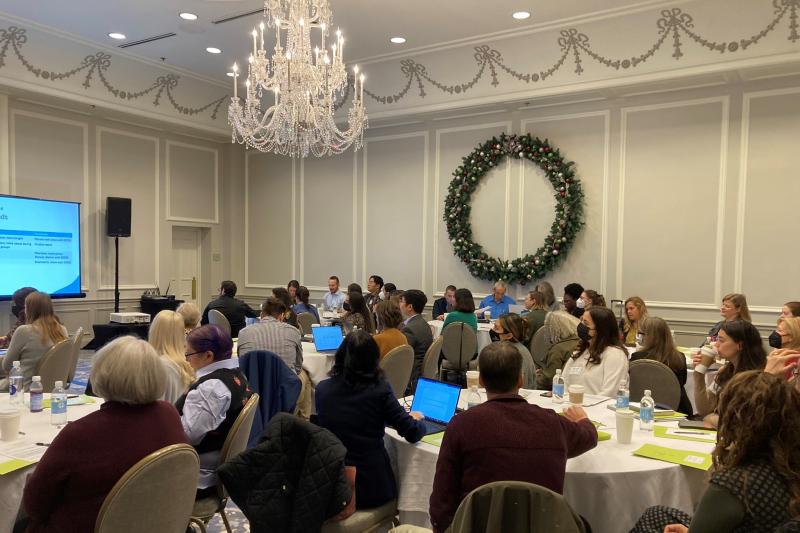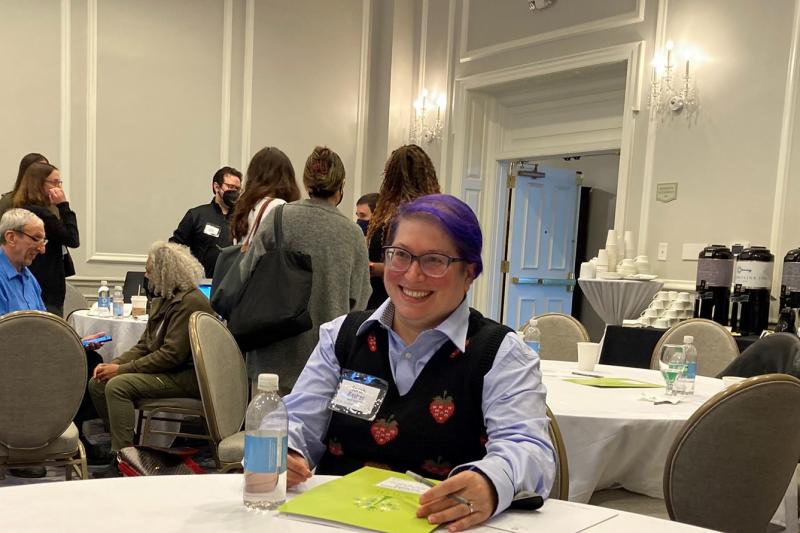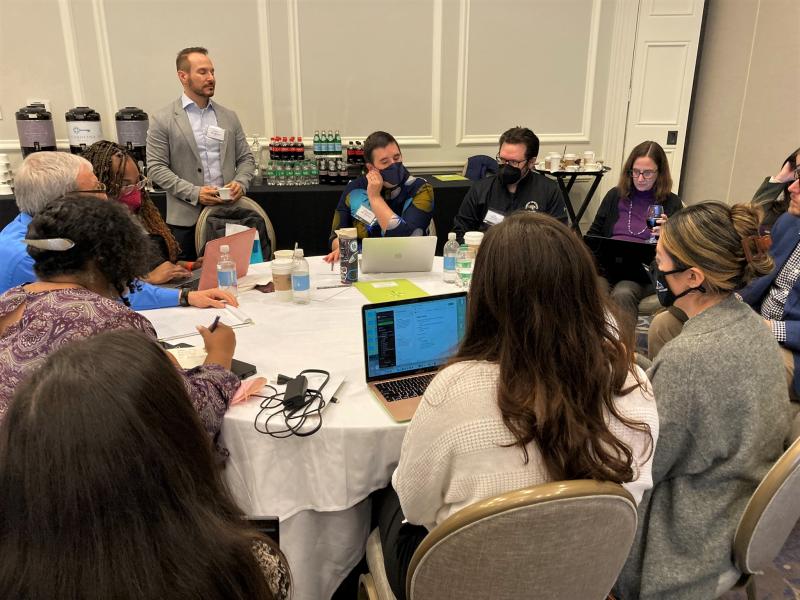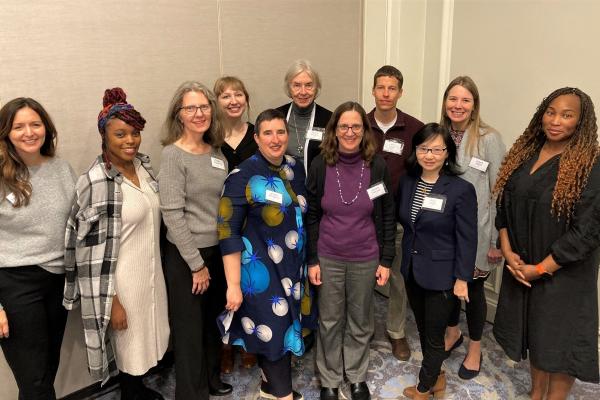
Data Camp, an idea incubator, supports stronger research-practice partnerships
The Educare Learning Network, a coast-to-coast consortium of state-of-the-art, full-day, year-round schools serving children from birth to 5 years, promotes access to quality early learning opportunities so every child can thrive. As the Educare Learning Network’s National Evaluation Partner (NEP), UNC Frank Porter Graham Child Development Institute (FPG) serves as the consortium’s research and evaluation data center, which is led by Donna Bryant, PhD, Gisele Crawford, MAA, Iheoma Iruka, PhD, Laura Kuhn, PhD, Sandra Soliday Hong, PhD, and Noreen Yazejian, PhD.
In its role as National Evaluation Partner, FPG focuses on three areas:
- leadership and coordination within the Network;
- protocol development, data collection systems, and data management; and
- dissemination of results from the Educare National Evaluation inside and outside the Network.
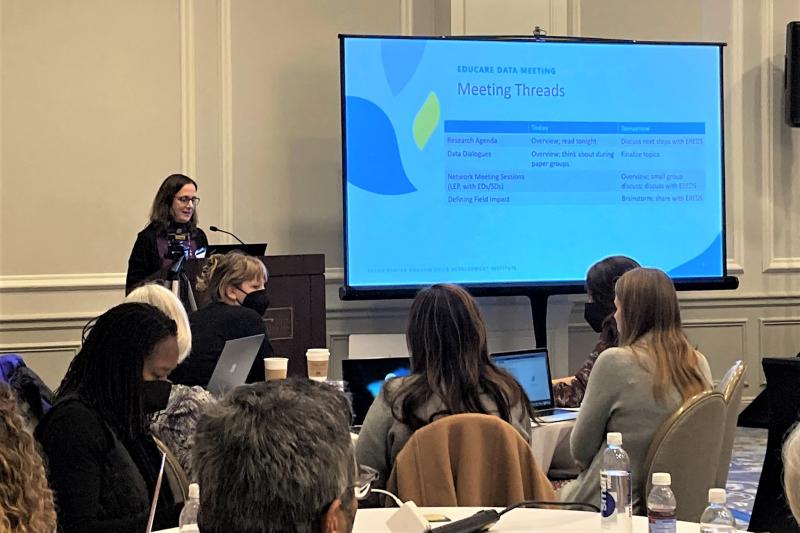
FPG researchers, programmers, and statisticians provide day-to-day technical assistance for local evaluation partners (LEPs) working with each of the 25 Educare schools to collect and use data. In addition to this daily interaction, they (NEP/FPG folks and LEPs) along with representatives from Educare partners Start Early and the Buffett Early Childhood Fund, meet annually to talk data (and more)—something that began in earnest more than 15 years ago and is now formally called “Data Camp.”
Initially, beginning in 2006, folks from FPG and several LEPs would get together to chat during annual Educare network meetings. According to Bryant, in 2007 during the annual meeting in Denver, the FPG team and several LEPs spent an entire day sharing and discussing data. In February of 2008, FPG hosted the annual meeting in Chapel Hill, which was attended by evaluators and program directors—and several attendees once again made time to break off for data discussions.
While those first few meetings were mainly centered around planning what data to collect, those that followed saw attendees sharing real data, talking about analysis and, eventually, dissemination. “We had data-related meetings from the beginning” says Bryant, “but it wasn’t until 2013, when we started meeting twice a year, that we dubbed the second meeting “Data Camp.” The new moniker nicely encapsulated the meeting’s focus on analyzing the growing cross-site Educare dataset.
Contributing to the Educare Learning Network’s mission
“The Educare network is built on a platform of practice, policy, and research. Research is essential in identifying best practices and the continuous quality improvement activities that will lead to these practices. Research is also critical in that it provides the data necessary to promote and advocate for policy changes,” says Gladys Haynes, EdS, PhD, director of Nebraska Early Learning Initiatives at the Buffett Early Childhood Fund. “Often, it is at Data Camp that decisions are made regarding briefs to be written to promote the sharing of the data in meaningful ways so that it can be most impactful.”
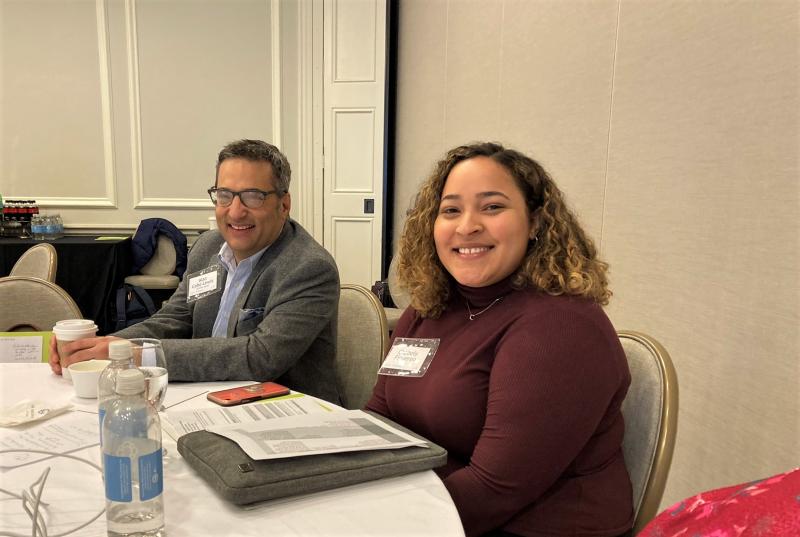
Alan Cobo-Lewis, PhD, director of the Center for Community Inclusion and Disability Studies at the University of Maine agrees with Haynes on the importance of research and data to the Educare network's mission. "A great strength of the Educare network is its commitment to being data-driven," says Cobo-Lewis "and we should capitalize on that. As the Network considers research going forward, to continue having a positive data-driven impact on the broader field and on policy, we need a strong research and evaluation component, including design of a good evaluation and multiple sites implementing the same interventions." Data Camp helps with that by bringing researchers and LEPs―especially new personnel―together to discuss what research could be explored within the Network going forward. Of Data Camp, Cobo-Lewis said it is a "very welcoming group committed to doing quality research to benefit children, families, and Educare personnel."
"The mission of the national Educare Learning Network is to advance quality early learning through partnership and innovation around practice, policy and research so every child can thrive," shared Amanda Stein, PhD, Director, Research & Evaluation at Start Early. "This data meeting hosted by the Network’s National Evaluation Partners at FPG affords evaluators and researchers affiliated with Educare organizations across the nation dedicated time and space to work together within a community of practice committed to advancing this mission."
Data Camp 2022
Data Camp pivoted to an online-only format in 2020 and 2021 due to COVID. This year, however, it was a hybrid event. In response to a call from many attendees to resume meeting in-person, FPG hosted Data Camp in Chapel Hill at the Carolina Inn. Thirty-nine people from around the country joined 12 FPG staff at the Inn, with six other attendees tuning in remotely.
Typically, during the event LEPs gather to engage in peer learning to improve their local research-practice partnerships―identifying challenges in the collection of data, positing possible solutions, and examining data trends across the Educare sites. There’s ample time for attendees—LEPs and researchers from FPG and Start Early—to plan Data Dialogues and other research presentations for the annual Educare Learning Network meeting, which is held in the spring. Invigorated and inspired by interactions with their colleagues, paper authors often make progress on their papers during the event, too. Furthermore, Data Camp attendees are eager to collaborate with the rest of the Educare network to define and pursue impact in the field.
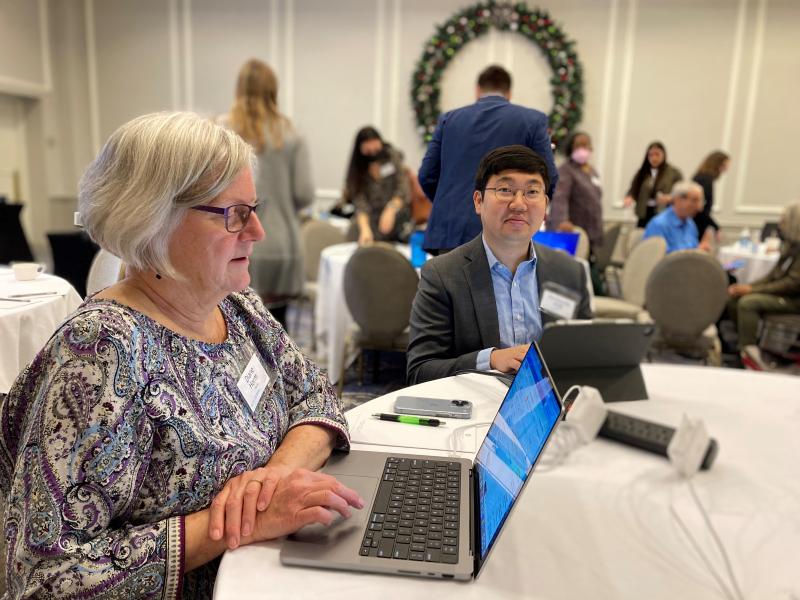
Start Early’s Stein emphasized the importance of cultivating these research-practice partnerships saying, “They drive data-informed innovation and a culture of continuous quality improvement within the Network. All of which will, ultimately, amplify a research agenda and evidence from Educare that contributes to the national discourse and shapes policy and systems change and practice improvement efforts to promote equitable access to excellent early care and education for all.”
Reflecting on past gatherings and the most recent one, it’s clear that attendees are continuing to focus on racial equity and the future of early care and education. At this year’s event, Iruka and Allison De Marco, PhD, an advanced research scientist at FPG, led a work group discussion on the NEP/LEP community of practice racial equity programming. Later that day, there was a session to discuss paper ideas using experiences of discrimination and/or racial socialization data.
Other sessions throughout the event included topics such as:
- Child attendance: links between child and family characteristics, attendance, and child outcomes
- Stress and child-centered beliefs related to child outcomes, reflective practices, and instructional support
- On-demand reporting and data visualizations
- Parent participation, parent survey response rates, and strategies for increased engagement
In addition to the workgroup sessions, the Flint Early Childhood Research Program Partnership gave a 75-minute presentation on “Expanding Beyond the Walls of Educare to Advance Equity and Impact in Flint, Michigan.” Educare Flint Executive Director Ja’Nel Jamerson and the LEP team from American Institutes for Research (AIR) shared their journey on how they have expanded community involvement in planning, conducting, and interpreting research at Educare Flint and partner schools over the last five years. They challenged the Network to think in new ways about how to engage in authentic research-program partnerships and how to elevate community voices in the research process.
Feedback from the floor
Whether this was their first Data Camp or their seventh, attendees had many positive thoughts to share when asked about the event.
Sue Rasher, MEd, director of OER Associates LLC, says Data Camp is an incubator for ideas―both big and small, but all of which are incredibly impactful on her and her colleagues' work. "What's especially helpful about Data Camp is that it brings everyone together," said Rasher. "With 25 different sites, you can be very isolated and not know what other sites are doing. Attending Data Camp supports stronger research-practice partnerships, where we can get new ideas so that we can be more effective within our sites."
FPG’s Kuhn and first-time attendee, Lynda Keating agree that making connections is key.
"The best of data camp for me is getting to talk face-to-face with the LEPs," says Kuhn. "I love to hear about what is going on out in the field and about the challenges and new innovations the schools are experiencing. It is amazing to see how much the Network has expanded over the years and that we represent early care and education centers all across the country."
"As someone new to the event," said Keating, who manages assessment administration for the Educare New Orleans program, "the most helpful aspect for me about Data Camp was networking with other LEP members and finding what other sites' challenges and successes are at their Educare schools." Keating shared that it was reassuring to learn that other teams have had similar challenges collecting parent interview data and that she was able to get valuable input from another first-time attendee, Melissa Acton. "I connected with Melissa, in particular, who shared how her team collects the parent interview data in the fall. She shared a revised parent interview that they use at their site that can potentially be used at my site to make the fall collection of the parent interview process easier for the family advocates."
Gladys Haynes shared that she was most impressed with the racial equity research agenda that has been generated. “I believe it is a bold document and one that has the potential to not only inform the practices of the Educare Learning Network but also the broader early childhood field,” said Haynes, “FPG has done an incredible job over the last two years in promoting racially equitable research practices.”
Furthermore, Haynes was thrilled to see an influx of several new attendees experiencing their first Data Camp. “It is always good to bring in new ideas and perspectives,” says Haynes. “My advice to those new to Data Camp is, ‘Don’t be shy, jump right in.’ Many of us “old-timers” never had training in parent and practitioner involvement in designing and decision making around the evaluation process. It was good to hear the “younger generation” ask questions about what parents might be thinking or how to best involve them in the data collection and/or how to share evaluation results with them!”
